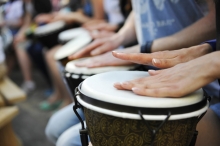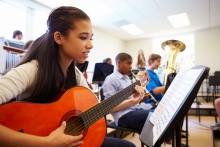Music is a collective experience that binds people together. From orchestral play to audiences handclapping, synchronization lays the foundation for all musical interactions. But what explains our ability to get in sync with someone or act in lock step with a group?

How do people coordinate their actions with the sounds they hear? This basic ability, which allows people to cross the street safely while hearing oncoming traffic, dance to new music or perform team events such as rowing, has puzzled cognitive neuroscientists for years. A new study led by researchers at McGill University is shining a light on how auditory perception and motor processes work together.

By Cynthia Lee
Everyone marches to the beat of their own drum: From walking to talking to producing music, different people’s movements occur at different speeds.

Head movements play an important role in conveying emotions through speech and music. Let your head do the talking.


Bobbing your head, tapping your heel, or clapping along with the music is a natural response for most people, but what about those who can’t keep a beat?


